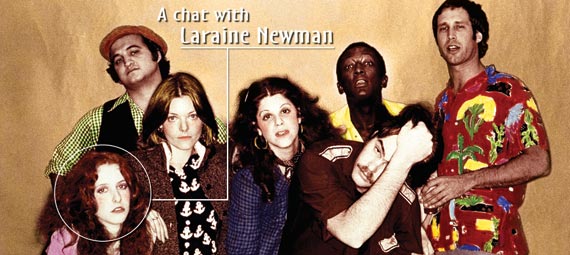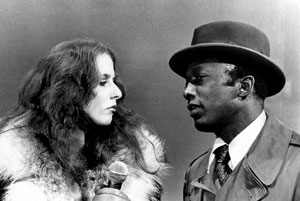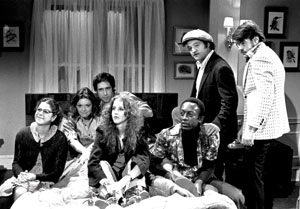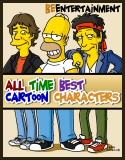
12/04/2006
TV Home / Entertainment Channel / Bullz-Eye Home
Although her name still rings a bell with anyone who was tuned in to NBC at 11:30 on Saturday nights from 1975 to 1980, Laraine Newman – one of the original cast members of “Saturday Night Live” – has a tendency to cause people, upon hearing her name, to say, “Hey, what’s she been doing for all these years?” Well, it may surprise you to learn that she’s worked pretty steadily; the majority of her work these days is done in the form of voicing animated characters (she can be heard on various episodes of “The Tick,” “The Oblongs,” and “Harvey Birdman”), but she’s also done stints on “7th Heaven” and “According to Jim.” With the release of “Saturday Night Live: The Complete First Season,” Newman’s doing a fair amount of flashing back for promotional purposes. Bullz-Eye had a chance to chat with her about how she ended up on “SNL,” how subversive the show’s comedy was, and how you know you’re famous when a Beatle recognizes you.
Laraine Newman: Hi, Will, how are you?
Bullz-Eye: Not bad. You know, I have to admit that I haven’t yet gotten a copy of “SNL: Season 1,” but, by coincidence, I did just get finished watching your stint on the first season of “St. Elsewhere” as Tweety.
LN: Oh, really? Oh, my God. Oh, dear. (Laughs) The bird woman.
BE: Yes. They gave you quite a soliloquy at the end of that episode.
LN: Yes. Oh, that was so long ago. I don’t have a copy of it, but I remember my daughter asking me if that episode was in color! That’s how long ago that was.
BE: And just to clarify, although I don’t have it, I am totally psyched to check out the “SNL” set.
LN: You know, I don’t know how old you are, but that will inform your enjoyment of it.
BE: I don’t mean to make you feel old, but when you left the cast, I was nine.
LN: Okay, yeah, I…no, I can accept it. It’s the weight gain that I can’t accept. But, anyway, there’s a lot of commercial parodies in there that directly reflect existing commercials. And then, of course, there’s other stuff that is unto itself, like, “It’s a dessert topping and a floor wax!” Things like that, which do hold up a lot. But, you know, it’s interesting how political the show was. Gerald Ford was the president at the time, and the running gag, of course, was that he was dumb and clumsy…and in watching it, I was so wistful, because I was thinking, “Well, at least he was benign!” At least he didn’t have us in a war that had no end and wasn’t destroying the environment and…wasn’t doing shit like that. Ah, for that time again!
BE: Does it feel bizarre to see Al Franken nowadays and think, “This guy is a major political humorist”?
LN: It makes sense, you know? The first time I saw Franken and (his writing partner, Tom) Davis was before the show; they were at the Comedy Store, and their hair was as long as mine is, but I’d known that Al had gone to Harvard, and he’d always really been very political. It’s absolutely the natural progression, but the fact that he might run for office is just hilarious!
BE: I’d read the story about how he once got on Ronald Reagan’s press bus…
LN: (Surprised) I didn’t hear that!
BE: Really? Yeah, he was asking Reagan questions, and one of them was clearly ridiculous, but Reagan tried to answer it, anyway…and, later, they threw Franken off the bus, saying, “You can’t be a reporter and a member of the public both.” (Writer’s note: according to Doug Hill and Jeff Weingrad’s Saturday Night: A Backstage History of “Saturday Night Live” – which, while unofficial, is nonetheless the single best look at the first ten years of the show you’re likely to find – Franken’s question was, “Uh, yeah, earlier today, you said you were against mandatory motorcycle helmets because that was a limit to personal freedom, yet you are against decriminalization of marijuana because marijuana causes brain damage. Can’t not wearing a motorcycle helmet cause brain damage a lot of quicker than marijuana by, for example, the head splitting open so that actual material from the road enters the brain?”)
LN: Oh, how interesting! What Borat would have done with that!
BE: Exactly. So you were in the Groundlings…
LN: Yes.
BE: Who else was in the troupe at the time?
LN: When I was in the Groundlings? Phil Hartman. In the very beginning, it was a very kind of eclectic group: Pat Morita, Jack Soo, and Tim Matheson.
BE: Was Cassandra Peterson in there at the time as you?
LN: No, that was way after. Way after. And an actor who…Simon Helberg, who’s on “Studio 60,” his father, Sandy Helberg, was in the company at the time. I was at Simon’s bris.
BE: Wow.
LN: Talk about feeling old! And, also, Chris Kattan is the son of a Groundling…a guy named Kip King, who’s incredibly funny…and then he became a Groundling himself.
BE: I know you had worked on a Lily Tomlin special in the early ‘70s. Was that how Lorne (Michaels, longtime “SNL” producer) came to know who you were?
LN: Yes, they had come to see me at the Groundlings. They were looking for guys, actually, and I was doing my character, the “Valley Girl,” and they hired me on that. I played her in a sketch called “Susie Sorority.” It was a great character that Lily did. And then he came to see me again when Dick Ebersol approached him about (“SNL”).
BE: Did anyone else from the Groundlings follow you out to New York to audition for the show?
LN: No. And it’s almost like… (Laughs) …the fifth Beatle, people who were asked to do it but turned it down because they thought it was another summer replacement show, and they weren’t interested. I don’t know if you ever saw Eric Idle’s “The Rutles”…
BE: Yeah!
LN: Danny Aykroyd played kind of the Stuart Sutcliffe character, who quit the Beatles, and where he was now. It’s just so funny.
BE: So was the show really pitched to you as a cross between “Monty Python” and “60 Minutes”?
LN: Yes. And I had no idea who Monty Python was. I’d never heard of them.
BE: What was your actual audition for the show? What did you do?
LN: I didn’t audition.
BE: Oh!
LN: Lorne just saw me. Although once I got there, I had to pretty much audition for the writers, which was horrifying for me, because I have terrible performance anxiety, and I just become a complete meat puppet when I’m doing it. My life drains away from me. And I doubt they were very impressed seeing that material in that context.
BE: You said something a moment ago about playing a character. I’d read somewhere that you were never really a fan of playing recurring characters.
LN: Yeah, y’know, it was just…the folly of youth. I just thought… (Affects haughty British accent) …”I am going to dazzle them with my versatility! I won’t repeat characters; I’m not Ruth Buzzi!” Y’know? Well, great, nobody remembers you! Great!
BE: Obviously, you’d done TV before, but when “SNL” premiered, did it feel different? Clearly, it was a new kind of comedy, but did you have that feeling at the time?
 LN: I think it’s really hard, in the moment, to sense that you’re on television and that there’s a larger audience than the 300 people who are in the studio. The Lily Tomlin special had had an audience, too, so it was kind of par for the course for me.
LN: I think it’s really hard, in the moment, to sense that you’re on television and that there’s a larger audience than the 300 people who are in the studio. The Lily Tomlin special had had an audience, too, so it was kind of par for the course for me.
BE: Was it a matter of waiting for the media to pick up on it, then, to know that you were really doing something?
LN: Yeah. I have a memory of when Jill Clayburgh hosted the show. I was coming from having been photographed by (Francesco) Scavullo for a magazine cover, and I was still in my makeup, and I was walking in the lobby of 30 Rock, and out of my peripheral vision, I see these two forms that come into focus…and it’s John and Yoko! And as they pass me, John says, “Hi, Laraine.” Not just “hi.” “Hi, Laraine.” I could only, like, squeak a barely audible response, I was in such shock; I mean, he’d been my favorite Beatle. And that really gave me a sense of how many people were actually watching this thing.
BE: I know there’s been a lot of perception in the various biographies of the show that it was perceived as “The Chevy Chase Show” during the first season…or, at least, that’s how the media wanted to portray it. Was that how it felt within the cast?
LN: I think…I think the boys might’ve felt that. I don’t think the girls really…y’know, Chevy had “Weekend Update,” and it was really something that the media was trying to instill. It wasn’t something we felt on the show…although I remember that, when he was leaving, I thought, “Man, how can you do this to us? We’ve gained such momentum! We might not have a future if you leave!”
BE: And a couple of rapid fire questions. Do you have a particular favorite sketch you were in? Probably more than one, I’d guess.
LN: (Groans) Oh, God. I never know how to answer that question. You know, there were so many great things that were done that didn’t end up in the final show, but…gosh. I don’t have a favorite sketch. I really don’t.
BE: Okay, well, let’s try this angle, then: can you think of one that was cut at dress rehearsal that you really wished had made it?
LN: Um…yeah! There was a sketch that…I was fascinated by a movie director named Lina Wertmüller, and I had created this character for her. Raquel Welch was the host, and we just did kind of a parody on her style of movies, one of which was “Swept Away.” I think Madonna remade it, with (the original film’s star) Giancarlo Giannini’s son. And it was very esoteric, and it did not make it, but it was very clever. Raquel was in Italy and got Lina Wertmüller’s autograph, which was sweet of her.
BE: Did you have a favorite host, one that you were really excited about when they were there?
LN: Richard Pryor. He was my idol. And I had met him when I was 18. My sister (Tracy Newman) is a singer and a songwriter. She writes for TV – she was one of the four writers on the “Ellen” episode when she comes out, and she created Jim Belushi’s show, “According To Jim” – but at the time, she was an MC at all the comedy clubs, and she was friends with Richard Pryor. So I came to see my family and met him at the Troubadour when he first came to play there. And then, of course, when he came to do the show, he was probably one of the only people who brought writers with him – I don’t think any other host could’ve gotten away with that – one of whom was Paul Mooney, who is a great comic on his own. He has a great line. “White man’s justice? Just Us.” And he had written a loosely-structured parody of “The Exorcist.” So Richard and I kind of improvised it in a rehearsal hall, and I was making him laugh. It was probably one of the highlights of my life…along with John Lennon saying hello to me! But he was in an interesting phase of his life at that time. He was trying to get healthy, and I was bringing homemade soup to him on the set every day. I was actually one of the few women that got to be in a sketch with him; the rest of the people he brought.
BE: Did you actually have any scenes with him in “Wholly Moses”? I know he was in it, but it’s been so long since I’ve seen it.
LN: No. (Affects haughty British accent again) And you will not mention that movie again!
BE: Oh, dear. Forget I said anything.
LN: (Laughs) I’m just kidding! (Writer’s note: maybe only half-kidding. Newman’s Wikipedia entry says, “Newman's film career has been limited, having been hampered from the start by tepid critical and commercial response to her first leading role, supporting Dudley Moore in 1980's cameo-laden biblical satire Wholly Moses.”)
BE: So you’re doing some voiceover work now.
"I remember that, when (Chevy Chase) was leaving, I thought, 'Man, how can you do this to us? We've gained such momentum! We might not have a future if you leave!'"LN: Oh, yeah. A lot. And I love it. And I still…I work from time to time. I did an episode of “Brothers and Sisters.” I have two lines on “Entourage,” one of which alludes to giving Jeremy Piven a blowjob.
BE: Nice.
LN: (Cheerily) I’m so proud! But I do love that show. And I’ve written a book, and I’m trying to work on a second draft, so I can shop it.
BE: Fiction or not?
LN: It’s about my life.
BE: Okay. And something I was curious about: from what I’ve read, there doesn’t appear to be any audio commentary on the episodes. Was that something you were ever approached to do?
LN: No. I think they did want to do it for…they were going to re-release the compilation stuff for Danny and John (Belushi), and they wanted new commentary from the actors, but that was the only time. They did not approach me for commentary on this one; they don’t seem to have it at all.
BE: It seems surprising that they wouldn’t take advantage of the opportunity.
LN: But then they’d have to pay us! (Giggles)
BE: Say no more. Do you know if further season sets are in the works?
LN: They have not told me. I imagine they’ll wait and see how well they sell, or if there’s really a market for it. I’m constantly amazed that there’s still an interest in those original five years, because that generation is not as large as the 18–32 market, which is the target audience for all things. So I don’t know if they will or not.
BE: I think a lot of people will be surprised at how subtle a lot of the sketches are, in comparison to the current incarnation of the show.
LN: But there’s also stuff that no one could ever get away with now!
BE: True.
LN: One of Albert Brooks’ films is called “The Unbelievable Truth,” and there’s a sketch in it where they announce that they’ve lowered the age of consent to seven. And they show this guy having dinner in a restaurant with a seven-year-old girl. And it’s… (Laughs) …I mean, it’s completely subversive and horrifying! None of us were parents at the time; now, it would absolutely just be a knife in our hearts…just like Uncle Roy.
BE: I was just getting ready to say something about Uncle Roy. You’d never see that today. (Writer’s note: Even if you’re not a parent, watching the Uncle Roy sketches – which starred Buck Henry – will make you cringe and wonder how they ever got on the air. In a nutshell, Roy Fogul is a 45-year-old bachelor who babysits little girls and plays games with them like Undress Dolly with a Vacuum Cleaner, Invisible Leg Doctor, or Slide Down the Banister with Mary Poppins, then tells the story of Eddie the Eel and Debbie the Donut.)
 LN: Yeah, you could never do that now. So…subtle? Maybe. But I think more subversive, in the sense that P.C. wasn’t even a concept. It was more about, you can’t allude to graphic sex, you can’t allude to religion. I mean, one of the sketches that was done that never made it was Jesus Christ’s high school reunion, and it was, like, “Jesus, it’s good to see you! Christ, you look good!”
LN: Yeah, you could never do that now. So…subtle? Maybe. But I think more subversive, in the sense that P.C. wasn’t even a concept. It was more about, you can’t allude to graphic sex, you can’t allude to religion. I mean, one of the sketches that was done that never made it was Jesus Christ’s high school reunion, and it was, like, “Jesus, it’s good to see you! Christ, you look good!”
BE: (Laughs)
LN: And it never made it…and, of course, I think I’ve since seen that somewhere else.
BE: Was that a Michael O’Donohue sketch, by any chance?
LN: (Pauses) I can’t remember. It might’ve been. Him or Franken and Davis.
BE: Was (O’Donohue) really as anarchic as legend would have you believe?
LN: He was. But, you know, like anybody else, it hides a soft core. Such a sweet guy. You know, when I got to New York, I was robbed of everything I had – it was all packed in my car, and my car was stolen – and when I came back after five years, I realized that a third of my possessions were gifts from him and Ann Beatts.
Universal Rep: Do you have one more question, Will?
BE: I do. One final one: do you stay in touch with any of the other original cast members now?
LN: Yeah, Danny, when he comes to town, as well as Jane. When she comes to town, I see her.
BE: Is Garrett in England?
LN: I don’t know where he is!
BE: I looked online for contact information for him, and his agent was listed as being in London.
LN: Really? I have no idea.
BE: Fair enough. Well, it’s been a pleasure talking to you.
LN: Thank you so much. It’s been nice talking to you, too, Will.








